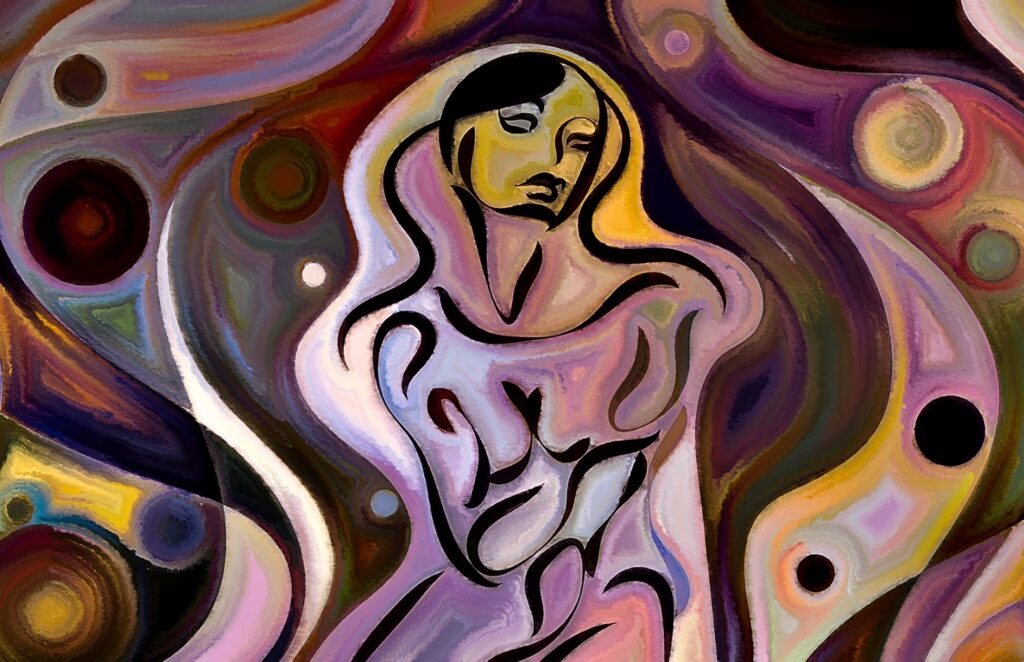Seven years ago, my best friend died of a Xanax overdose. Everything before her death happened so fast, but everything afterward moved in slow motion. I remember when I got the call from her boyfriend. He was in tears. “Ina’s dead,” he said. My stomach dropped. It wasn’t real; it couldn’t be. “No, Rick. No, she’s not.” “Yes, Scheri, she died last night. I’m so sorry.”
She died the night before, likely in her sleep. I knew she had been very depressed at the time. You never would’ve guessed on the outside, because she was the most bubbly and excitable human. But her last message to me was telling me how horrible a place she was in mentally. I told her I could come right over if she needed me. She never responded, but I remember telling her family it couldn’t have been possible that she died that night. She had read my text message early that morning! When they told me that was because the detective had opened her phone with her dead fingerprint as he examined her body, I almost threw up.

I’ll never forget cleaning out her house. She called it Lil Casa (Lil for short), as she lived in a small two-bedroom house with her roommate downtown. It was a cute place, and she threw fantastic parties there in the summer. Some nights, I would come over, and we’d smoke a joint, raid her fridge, sit on the floor of her bedroom, and chow down on leftovers while watching “Modern Family” and giggling about some girly nonsense. When I met her family at the house to clear it out after she died, her mom gave me some of her things she couldn’t bear to keep: a bright blue pillow that said “Love You More” on one side, “Love You Most” on the other; a pretty turquoise vase with big, pink fake flowers inside; a red Longchamp bag; a black jacket she and I both loved.
She always called me her “soul sista” (which was the most white-girl thing ever) and said I was her ride-or-die. We wanted to travel together and explore and share our positive energy with everyone we met. When she died, I couldn’t stop thinking we had so much left to do.
I believed I was the cause of her death. I was the one who told her how easy it was to get ahold of a Xanax prescription. At the time that I told her that, I had no idea that she’d had a history with pills. I didn’t know that mixing alcohol and Xanax was so terribly dangerous, and I didn’t know it was something people commonly did recreationally.
About nine months before her death, I had gone to a women’s health doctor at a prestigious clinic nearby because I had been struggling with hormonal issues. My PMS was awful; I would get so anxious and depressed, but only for a week out of the month. I told the doctor I had no desire for any antidepressants or anti-anxiety medication for symptoms that only happened for one week out of the month, but she insisted on sending me home with a bottle of Xanax. “If you’re going to drink while taking them, only have, like, one glass of wine, okay?” I’ll never forget her giggle as she said it. She spoke about this medication like it was candy. Like it couldn’t kill you if you mixed too much of it with alcohol. I could not have been less prepared for what happened next.
When I told Ina that the doctor had given me Xanax without me even wanting it, she seemed fascinated. A week later, she got herself a prescription of her own. It was as easy for her to get ahold of as it was for me. She told me she didn’t really need it for anxiety at the time, but wanted some for fun once in a while. Over the next few months, she told me she would take it often just to get through the workday. Her work had become overwhelming, and she was constantly unbearably anxious. Soon, she was taking it while drinking and blacking out more often than not. She needed to numb the pain and fear.
I should have told someone what was happening, but it all happened so fast. With how cavalier the doctor had been about drinking while taking it, I wasn’t sure how serious the problem was. My roommate in college had had a Xanax prescription too; she often drank while taking her medication. She seemed to have been fine. I did not know how dangerous what Ina was doing was. Ironically, a week before she passed, her roommate and I had a plan to sit her down and talk to her about it. We were starting to get worried. We never got the chance.
When you lose someone close to you, death comes so near. It feels like you could just leave this earth so easily too if you wanted. On bad days, ridden with guilt and grief, I really couldn’t handle what had happened. I couldn’t focus, I cried constantly, and everything became dull and gray. I could not understand how my friend was gone and had left me behind.
So I got a prescription for antidepressants and Adderall. It was so easy. I’d taken Adderall in college every now and then too; it was super easy to get a prescription from the doctor and then use it to study like crazy for exams. I knew it would help me at work too. I also knew it wouldn’t pull me out of the depression entirely, and I needed help with that, so I made sure to get a prescription for some antidepressants as well. In college, kids would tell you, it’s so easy to get these prescriptions: just fill the forms out the right way, answer their questions the way someone who needs the medication would, and the doctor will hand them over. Want Adderall? Say you’re disorganized, you lose things often, you can’t stay focused, you fidget. Want antidepressants? Say you’re hopeless and miserable and can’t deal with day-to-day tasks. Do NOT say you’re suicidal; that might mean they won’t give it to you.
It was scary easy. I knew more people who were on these medications than who weren’t. And you could keep asking for higher and higher dosages by saying you didn’t feel the effects. You could even go to a different doctor and pretend you didn’t already have a prescription and get prescribed even more medication. How were they not tracking the amount of medicine they doled out? The danger was insane. We were playing with fire, and we had no idea.
The years after my friend passed away were bleak. The antidepressants did nothing to help. I wasn’t exercising, I wasn’t taking vitamins, eating a healthy and balanced diet, sleeping enough, or in therapy regularly. I didn’t journal, meditate, or even breathe properly most of the time. I drank with my friends constantly, often while on the medication. This sent me into an even worse spiral. When I ran out, I went to another doctor or psychiatrist and simply asked for more. I remember only one doctor telling me that if I started exercising, it might help me rely less on medication. When I told her I didn’t have time to exercise (which is the most common excuse for not exercising), she prescribed the higher dose I asked for.
Multiple times during this period, I found myself at such low points that I wanted to take my own life. I’d been very depressed in the past, but it wasn’t until I took antidepressants that I ever got low enough to want to act on it. It’s hard to believe that the medication didn’t have something to do with it. At every low point, I was only prescribed more or another brand of medication. I gained significant weight, my head was constantly cloudy, and my family couldn’t recognize me. I couldn’t recognize myself.
After five years of floundering and barely making it through each depressive episode, only to be numbed further, something clicked. The medication wasn’t helping me; it was making me much worse.
I made the decision to stop the medication, and I spent all of my free time finding healthy, non-prescription strategies to manage my depression. I started weekly therapy; I researched and began taking vitamin supplements to boost my energy and balance my mood. I began to exercise very regularly. Over time, my symptoms of depression began to dissipate. And if they did return, they were far less overwhelming, and I could handle them. I never again got to the types of lows I had while on the medication.
Mental health in America is approached in a way that is bizarre and horrifying. In the past five years, each year around 14,000 people have died from prescription medication overdoses. This epidemic is unique to the United States. In Europe, the rates are nearly half of what we see in the United States. In India, they are 85% lower than in the United States. In many other countries, doctors will not prescribe medication for mental health issues until patients have tried holistic approaches first and those truly have not worked. My family is from India, and while visiting once, I ran out of my antidepressants. I saw several doctors, and it was extremely difficult to get a new prescription because in India, they genuinely don’t believe that antidepressants are safe to prescribe. When I did finally get a script, it was for half the dosage I was on, and only for the remaining days I was in the country.
Many (not all) patients could resolve a lot of their issues by changing their lifestyle in positive ways. The problem with using medication as a band-aid approach to mental health issues is that it means young people and people with addictions or deep trauma can easily get ahold of dangerous medication, leading to deaths that are almost entirely preventable. My friend’s death was entirely preventable. We need more regulation of psychiatric medication in America. It should not be as easy as it is to get ahold of medication that, if not properly taken (which is more socially common than you think), could kill you.















There was only one preventable tragedy – the big bang. It should be convicted in every court of the land. Instead we convict these strange results of the big bang for being what the big bang made them be. It’s a painful contradiction in the Western mind but to affirm the truth would destroy the basis of the legal system and expose law as power, tyranny, violence and untruth. And this would not be convenient either for lawyers, business, politicians and other grifters. It wouldn’t be good for psychiatry either, but psychiatry isn’t good for anyone except for the many profiteering parasites that infect us and throw the dust of invented concepts into our eyes and inject our brains with it’s narcotizing grift gigs that reproduce themselves as propaganda through our unwitting lips. This is the truth people. Ultimately there is only one chief pharmacist and chief psychiatrist today but he doesn’t take calls. He’s a bit like Putin but he doesn’t rein in Moscow – he reins in hell. And he’s recently expanded his operations, taking over Earth through our own greed and stupidity. Oh how we laughed. Any culture that elects Donald Tramp, a climate denier who is trying to divide and provoke civil war in America, clearly and objectively condemns itself for it’s own unsustainable, criminal and catastrophic stupidity. If the average belief structure of an American was communicated to a 1950s psychiatrist in his or her office you could be sure it’d only be a short walk to the hospital door. Now this belief structure has already become normal, and is vying for a place in accepted official reality, which is manifestly, obviously, clearly a demonic perversion and destruction of reality. And it’s not like we can whip out a fresh reality to put in its place. Even when everyone discovers it’s unreality they will have no spare reality to pull and and replace it with, so this permanent meaningless unreality becomes our new permanent prison and new permanent hell. Our last prison system of reality was boring, but the grass is always greener on the other side. On this side the grass is scorched and catching fire. But at least there’s something to watch on the news with the whole world falling apart and evil memes taking over and destroying the autonomy and intelligence and clarity and sanity of the brains and consciousness of the world. A blind and clouded and confused brain cannot solve the historically accumulated mistakes that less clouded, less confused, more intelligent brains with more space and energy and rationality produced and unwittingly accumulated. The destruction of the whole mistaken structure of human existence must be destroyed, and that structure is everything we know and are. But there are great buy one get one free deals and Walmart. Have a nice day.
Report comment
Scherezad, you are not responsible for what happened to your dear friend. Her prescribing doctor is at fault, not you.
Thank you for writing publicly about her. Honoring her memory may help spare someone else.
Report comment
Butchers. Pastry chefs. Fatty flesh. Fleshy tumours. A fleshy oil slick through time poisoning eternity with it’s mistakes. The poison stimulates a response mechanism the intelligence of which cannot be measured, and the meaning of which cannot be measured by words. Really the meaning is already here, in what we know, which means what we actually know through observation, experiment and enquiry, not what we have dreamed up theoretically and imagine to be true, because obviously this clouds and distorts the clear facts, and knowledge properly being understood as a socially conditioned means of communication and social technique. The plain facts about the evident complexity of a simple cell, a picture which has only really emerged clearly in recent decades, is enough to assure you that biology right down to the cellular level is an astonishing, miraculous, ungraspably intelligent thing, with puzzling, profound complexity right down to the molecular level, intelligent to the extent that no human mind or brain could ever assimilate. The brain can only marvel in silence. Indeed the closer we look, the more we discover, the more the hope of grasping it’s profound complexity recedes, indicating it will be forever ungraspable and will confound all previous assumptions as we penetrate further. Same with the Universe. And we haven’t even begun to understand consciousness: understanding is impossible where we confuse knowledge with it. And all knowledge is socially conditioned, socially sanctioned perceptions at best. Most of what we think is ‘knowledge’ in our own heads is non-factual belief, opinion and conclusion, and this is socially conditioned security motivated life activity that has nothing to do with the truth and makes an idiot out of you and everyone else who thinks this activity really is who they actually are. Obviously not. You are not that free radical in your head called thought that flits around like an electric devil pretending to be this and then that. Wow. Something got angry when I said that.
Report comment
I don’t know much about the origin of life but I see Dick and Fanny over there looking guilty. The biggest most palpable mystery in our lives is the energetic and conscious total process we call ‘sex’ yet we think we know what it is merely by calling it a word. How the male and female? Even Darwin could never begin to answer this question. The yin and yang rolls forever away from us as we pursue it with the full force of human existence trying to capture it with words, as if we could catch a butterfly or a mouse with mere words. And we are that total avalanche destroying the Earth for this one mysterious and unreachable thing that we always are beyond our words. But nothing can ever capture itself. There is nothing to be caught and what can nothing catch? It sees and absorbs all into itself, that all being beyond itself and ever unreachable. It too is the unreachable. There is only the unreachable, the unreachable seen, and the unreachable that sees. But seeing and seen are always one. And it’s an exquisite mystery how we ever managed to tease them apart.
Report comment
Thank you for writing this and highlighting side-effects/lowering quality of life while on these “treatments”. This is the standard. Hundreds of thousands of people, including myself, can 100% relate.
“Iatrogenic injuries” is important to highlight as well. I learned that term from BeyondMeds and SurvivingAntiDepressants a couple of years ago. Same with “informed consent” (which I never ever EVER gave ANY of the countless times since all the way back to 2012) and “Polydrugged”.
Since 2012, Psychotropic Pharmaceuticals haven’t increased my quality of life whatsoever. They’ve done the exact opposite vis-a-vis side-effects and CREATING a chemical imbalance in my brain, nervous system, endocrine system, digestive system, etc while on the drug and in withdrawal/discontinuation.
My “depression” and “anxiety” was 100% environmental due to modern-day society and inadequate parenting from generational trauma.
I’ll be spending the last 1.5 years of my 30’s and probably my early 40’s getting off of all of this nonsense garbage. It’s not “treating” anything and has always wrecked havoc on my safety, wellness, health, quality of life, etc.
***Once again, I want to re-state the term “informed consent”.*** If a Walk-in Clinic doctor/Family Doctor/Psychiatrist even gave the slightest of damns, they would’ve informed us about side-effects, withdrawal/discontinuation “when our life was going better”, etc. There’s a reason they always start getting coy and change body language when you start talking about side-effects, iatrogenic injuries, withdrawal/discontinuation (both acute and protracted/long-term, etc). In any other industry besides Psychotropic Pharmaceuticals, it’d be a legitimate liability, malpractice, and quite-frankly lawsuit.
If we had known that the Chemical Imbalance theory isn’t actually evidence-based, then we wouldn’t have started this “treatment”. If we had known that it’s not clear how these drugs work, how they know what to do, the protective blood-brain barrier, that these drugs are not compatible with evolution (hence the side-effects and withdrawal/discontinuation), we would’ve never gotten involved with this “treatment” either.
The relentless and intense medical gas-lighting we experience about side-effects and withdrawal/discontinuation is keeping the Counselling Industry alive as well.
We’re the ones losing money, jobs, housing, etc from these Pharmaceuticals while on them and in withdrawal/discontinuation. Not them. There are consequences/repercussions for us; not them.
Thank you, once again.
Report comment
Unfortunately, most doctors (in all branches of medicine) don’t go over the side effects or withdrawal effects on the medications they prescribe. I can’t remember any of my doctors going over this information. A few of them briefly mentioned some side effects.
I had a rheumatologist prescribe baclofen (muscle relaxant) for me. It’s addictive and there are withdrawals if you cut done or stop taking this medication but he never told me that. I think not going over the medications is very common. They don’t have the time or want to spend the time to explain all that could go wrong and they don’t want to scare their patients. They want the pharmacist to deal with it but they usually won’t talk to you either. It’s common practice to put a print-out of this information alongside the medication and they want you to read it yourself. Most of them don’t want to spend the time explaining the cons of many medications.
Report comment
Anonymous completely agree with you.
Report comment
THC would be a more natural way to reduce anxiety and help a person sleep and even help with pain for us old men and young women.
Report comment
Actually, people should be able to buy drugs without a prescription. However, there needs to be informed consent. Doctors and big pharma have the responsibility to inform honestly and not spread lies and propaganda, and consumers have the responsibility to do their own research before buying. Requiring people to get prescriptions is just medical gatekeeping that reinforces the power imbalance between doctors and patients. It does nothing to keep people safe, as doctors prescribe drugs to people they shouldn’t and fail to prescribe them to people who actually need them. People need to stop blindly trusting doctors with their health and start taking some personal responsibility. Sure, take the doctor’s opinion into account, but take it with a large pinch of salt and always do your own research too. Your life depends on it.
Also, the term “depression” is meaningless as it is currently used. Sure, true physiological depression does exist but it is a small minority of cases and the rest are not illnesses but rather emotions, like sadness, grief, hopelessness, etc. Emotions, while at times much more intense than we would like, are not illnesses, no matter how long they continue for.
Report comment